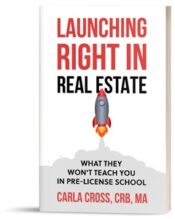
What you should ask–but don’t–in the interview.
One of the worst feelings real estate agents can get within weeks of signing on with a real estate company is that what was promised in the interview doesn’t seem to be reality. Why? Because candidates aren’t asking the right questions.
After having talked with hundreds of real estate agents, I’ve come to the conclusion that they pretty much hear the same sales ‘spiels’ from everyone during their interviews. And, if you’re a manager, you’ve probably been asked the same questions over and over. However, there are several questions the candidate should ask—but doesn’t.
It’s What You Don’t Ask that Will Give You Unpleasant Surprises
I’ll bet you will ask, “What services do you provide?” “What’s your commission split?” “What are you going to do for me?” Your interviewer has heard these questions many times before. She is ready with the kind of answers you’ll probably like—answers that are flattering, answers that may make the business sound like it’s easy money. She is a skilled, practiced salesperson! What you may not learn are the things that will actually make a difference in your career—positive or negative.
The Five Questions You Should Ask
 In my new book, Launching Right in Real Estate: What They Won’t Teach You in Pre-License School, I list five critical questions all candidates should ask. (Yes, you should act like and be considered a candidate for a sales position). Here are those questions, with the reason why you need the answers, and how to get your interviewer to step behind the curtain so you can get the rest of the story.
In my new book, Launching Right in Real Estate: What They Won’t Teach You in Pre-License School, I list five critical questions all candidates should ask. (Yes, you should act like and be considered a candidate for a sales position). Here are those questions, with the reason why you need the answers, and how to get your interviewer to step behind the curtain so you can get the rest of the story.
The Questions
- Minimum Expectations
What are your minimum expectations of agents in their first 3 months? Six months? One year?
Why would you want to know that? Because the office expectations need to be aligned with your goals. Otherwise, you may come to the office with high expectations, and get no help or guidance—because it doesn’t matter to the office how well you do. For example, let’s say you want to complete twelve transactions in your first year in the business. However, what you don’t know, is that the office has no programs that actually support your goals. They don’t expect agents to create enough business to earn being with that office. Their attitude is, “As long as I am adding licenses to my office, I’m okay with my franchisor.”
ln the Launching book, I share a survey I did with several hundred agents with less than three months in the business. 71% did not know what their manager expected of them. What they didn’t realize was that any production—or none—may suffice in that office. Would you go into any other job that had no expectations of you?
Managers: Do you have minimum expectations? Do you share them? Do you make hiring and termination decisions based on them?
- Launching my Career
How are you going to help me launch my career?
This is a tricky one, because clever interviewers will show you lots of sparkly objects that won’t mean much as you start the business. What will mean a lot: Specific onboarding procedures, classes that include practice and/or make you go to work and coaching with accountability. Oh, and a specific business start-up plan.
Ask to see the programs. After all, you will be learning the business based on how well these programs are constructed—or not.
 We believe what we see, not what we hear.
We believe what we see, not what we hear.
- Measuring Programs for Success
What kind of results do your business start-up plan and coaching get? How many transactions are new agents completing in their first three months?
Don’t just hear the sales spiel. Ask to see the numbers—and that includes all those who start, not just their superstar!
- Coaching and Accountability
Do you use a specific business start-up plan? Who will be coaching me to the start-up plan? How will I be held accountable?
Many new agents fail because they didn’t start with a specific plan. They did not have a coach holding them accountable to that plan for success. If you want to succeed, you will embrace the plan, the coaching, and the accountability.
By the way, don’t fall for ‘we let you create your own plan’. How would you be able to create an effective plan when you’ve never been in the business? Also, be aware that ‘our agents are so helpful’ just won’t suffice. You need someone who will help you create a plan of action that is meaningful to you in the long-term.
Note to seasoned agents: Ask yourself, “If I am changing companies, what about that change will help me grow and improve my business?”
- Specific Support
What other specific support will assure I am successful fast?
Ask to see the programs and the results. Be wary of hearing wonderful sales talk and ‘feel good’ words. You will quickly learn that ‘feel good’ disappears; the only good feeling is a sale!
Evidence and Detail
As a candidate, get behind those sales spiels and find out how the office really operates. To do this, ask for evidence and detail. (‘Show me’ not ‘tell me’). The interviewer who can show you exactly what those programs consist of and their outcomes is the interviewer you can trust to follow through.
By the way, there are 77 more topics/questions in the Launching Book, to help you gather the kind of information you need to make the best career decision for you.
The Three Big Interview Strategies
These questions will help you step behind the curtain to get the information you need to make the best decision for you. The three big take-aways:
- Go into the interview with these five questions, so you ‘encourage’ the interviewer to go past his canned answers.
- Keep probing on the same topic. Don’t let the interviewer avoid depth to keep you focused on the sparkly objects.
- Ask to see the statistics, programs, and courses. The evidence is your friend.
The Book You’ll Need to Succeed
Check out Launching Right in Real Estate. It’s great for you if you’re in pre-license, or launching your career–or re-launching your career.
Managers: Use this to save thousands of hours of time in the interview and help you pick winners.






